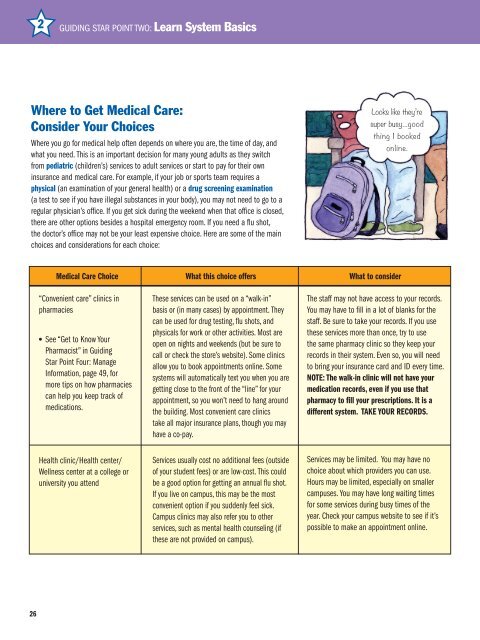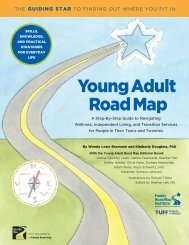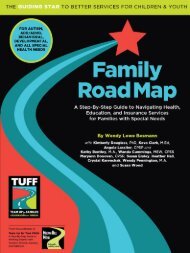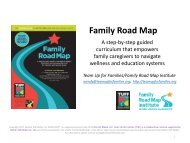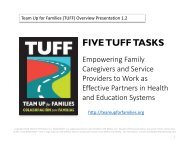Look Inside Young Adult Road Map
Create successful ePaper yourself
Turn your PDF publications into a flip-book with our unique Google optimized e-Paper software.
2<br />
Guiding Star Point Two: Learn System Basics<br />
Where to Get Medical Care:<br />
Consider Your Choices<br />
Where you go for medical help often depends on where you are, the time of day, and<br />
what you need. This is an important decision for many young adults as they switch<br />
from pediatric (children’s) services to adult services or start to pay for their own<br />
insurance and medical care. For example, if your job or sports team requires a<br />
physical (an examination of your general health) or a drug screening examination<br />
(a test to see if you have illegal substances in your body), you may not need to go to a<br />
regular physician’s office. If you get sick during the weekend when that office is closed,<br />
there are other options besides a hospital emergency room. If you need a flu shot,<br />
the doctor’s office may not be your least expensive choice. Here are some of the main<br />
choices and considerations for each choice:<br />
<strong>Look</strong>s like they’re<br />
super busy...good<br />
thing I booked<br />
online.<br />
Medical Care Choice<br />
“Convenient care” clinics in<br />
pharmacies<br />
l See “Get to Know Your<br />
Pharmacist” in Guiding<br />
Star Point Four: Manage<br />
Information, page 49, for<br />
more tips on how pharmacies<br />
can help you keep track of<br />
medications.<br />
What this choice offers<br />
These services can be used on a “walk-in”<br />
basis or (in many cases) by appointment. They<br />
can be used for drug testing, flu shots, and<br />
physicals for work or other activities. Most are<br />
open on nights and weekends (but be sure to<br />
call or check the store’s website). Some clinics<br />
allow you to book appointments online. Some<br />
systems will automatically text you when you are<br />
getting close to the front of the “line” for your<br />
appointment, so you won’t need to hang around<br />
the building. Most convenient care clinics<br />
take all major insurance plans, though you may<br />
have a co-pay.<br />
What to consider<br />
The staff may not have access to your records.<br />
You may have to fill in a lot of blanks for the<br />
staff. Be sure to take your records. If you use<br />
these services more than once, try to use<br />
the same pharmacy clinic so they keep your<br />
records in their system. Even so, you will need<br />
to bring your insurance card and ID every time.<br />
NOTE: The walk-in clinic will not have your<br />
medication records, even if you use that<br />
pharmacy to fill your prescriptions. It is a<br />
different system. TAKE YOUR RECORDS.<br />
Health clinic/Health center/<br />
Wellness center at a college or<br />
university you attend<br />
Services usually cost no additional fees (outside<br />
of your student fees) or are low-cost. This could<br />
be a good option for getting an annual flu shot.<br />
If you live on campus, this may be the most<br />
convenient option if you suddenly feel sick.<br />
Campus clinics may also refer you to other<br />
services, such as mental health counseling (if<br />
these are not provided on campus).<br />
Services may be limited. You may have no<br />
choice about which providers you can use.<br />
Hours may be limited, especially on smaller<br />
campuses. You may have long waiting times<br />
for some services during busy times of the<br />
year. Check your campus website to see if it’s<br />
possible to make an appointment online.<br />
26


